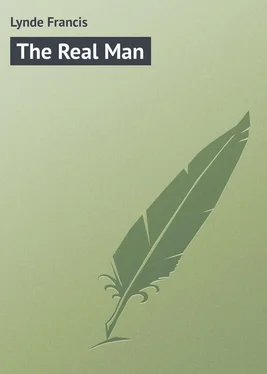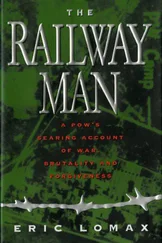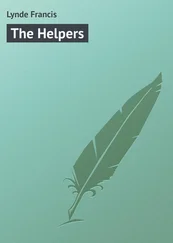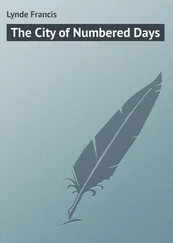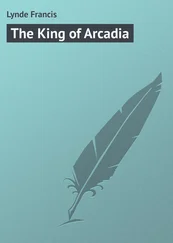Francis Lynde - The Real Man
Здесь есть возможность читать онлайн «Francis Lynde - The Real Man» — ознакомительный отрывок электронной книги совершенно бесплатно, а после прочтения отрывка купить полную версию. В некоторых случаях можно слушать аудио, скачать через торрент в формате fb2 и присутствует краткое содержание. Жанр: foreign_prose, на английском языке. Описание произведения, (предисловие) а так же отзывы посетителей доступны на портале библиотеки ЛибКат.
- Название:The Real Man
- Автор:
- Жанр:
- Год:неизвестен
- ISBN:нет данных
- Рейтинг книги:4 / 5. Голосов: 1
-
Избранное:Добавить в избранное
- Отзывы:
-
Ваша оценка:
- 80
- 1
- 2
- 3
- 4
- 5
The Real Man: краткое содержание, описание и аннотация
Предлагаем к чтению аннотацию, описание, краткое содержание или предисловие (зависит от того, что написал сам автор книги «The Real Man»). Если вы не нашли необходимую информацию о книге — напишите в комментариях, мы постараемся отыскать её.
The Real Man — читать онлайн ознакомительный отрывок
Ниже представлен текст книги, разбитый по страницам. Система сохранения места последней прочитанной страницы, позволяет с удобством читать онлайн бесплатно книгу «The Real Man», без необходимости каждый раз заново искать на чём Вы остановились. Поставьте закладку, и сможете в любой момент перейти на страницу, на которой закончили чтение.
Интервал:
Закладка:
A mile or more short of the construction camp the railroad made another of the many gulch loopings; and on its next emergence the train had passed the site of the dam, leaving it fully a mile in the rear. Here the young man at the car door saw the ditch company's unloading side-track with a spur branching away from the main line and crossing the river on a temporary trestle. There were material yards on both sides of the stream, and in one of the opposing hills a busy quarry.
The train made no stop at the construction siding, but a half-mile farther along the brakes began to grind and the speed was slackened. Sliding the car door another foot or two, the young tramp with the week-old stubble beard on his face leaned out to look ahead. His opportunity was at hand. A block semaphore was turned against the freight and the train was slowing in obedience to the signal. Waiting until the brakes shrilled again, the tramp put his shoulder to the sliding door, sat for a moment in the wider opening, and then swung off.
After the train had gone on he drew himself up, took a deep chest-filling breath of the crisp morning air, and looked about him. The sun was an hour high over the eastern mountains, and the new world spread itself in broad detail. His alighting was upon one of the promontory embankments. To the westward, where the curving railroad track was lost in the farther windings of the river, lay the little intermountain city of Brewster, a few of its higher buildings showing clear-cut in the distance. Paralleling the railroad, on a lower level and nearer the river, a dusty wagon road pointed in one direction toward the town, and in the other toward the construction camp.
The young man who had crossed four States and the better part of a fifth as a fugitive and vagrant turned his back upon the distant town as a place to be avoided. Scrambling down the railroad embankment, he made his way to the wagon road, crossed it, and kept on until he came to the fringe of aspens on the river's edge, where he broke all the trampish traditions by stripping off the travel-worn clothes and plunging in to take a soapless bath. The water, being melted snow from the range, was icy-cold and it stabbed like knives. Nevertheless, it was wet, and some part of the travel dust, at least, was soluble in it. He came out glowing, but a thorn from his well-groomed past came up and pricked him when he had to put the soiled clothes on again. There was no present help for that, however; and five minutes later he had regained the road and was on his way to the ditch camp.
When he had gone a little distance he found that the wagon road dodged the railroad track as it could, crossing and recrossing the right of way twice before the construction camp came into view. The last of the crossings was at the temporary material yard for which the side-track had been installed, and from this point on, the wagon road held to the river bank. The ditch people were doubtless getting all their material over the railroad so there would be little hauling by wagon. But there were automobile tracks in the dust, and shortly after he had passed the material yard the tramp heard a car coming up behind him. It was a six-cylinder roadster, and its motor was missing badly.
He gave the automobile passing room when it came along, glancing up to note that its single occupant was a big, bearded man, wearing his gray tweeds as one to whom clothes were merely a convenience. He was chewing a black cigar, and the unoccupied side of his mouth was busy at the passing moment heaping objurgations upon the limping motor. A hundred yards farther along the motor gave a spasmodic gasp and stopped. When the young tramp came up, the big man had climbed out and had the hood open. What he was saying to the stalled motor was picturesque enough to make the young man stop and grin appreciatively.
"Gone bad on you?" he inquired.
Colonel Dexter Baldwin, the Timanyoni's largest landowner, and a breeder of fine horses who tolerated motor-cars only because they could be driven hard and were insensate and fit subjects for abusive language, took his head out of the hood.
"The third time this morning," he snapped. "I'd rather drive a team of wind-broken mustangs, any day in the year!"
"I used to drive a car a while back," said the tramp. "Let me look her over."
The colonel stood aside, wiping his hands on a piece of waste, while the young man sought for the trouble. It was found presently in a loosened magneto wire; found and cleverly corrected. The tramp went around in front and spun the motor, and when it had been throttled down, Colonel Baldwin had his hand in his pocket.
"That's something like," he said. "The garage man said it was carbon. You take hold as if you knew how. What's your fee?"
The tramp shook his head and smiled good-naturedly.
"Nothing; for a bit of neighborly help like that."
The colonel put his coat on, and in the act took a better measure of the stalwart young fellow who looked like a hobo and talked and behaved like a gentleman. Colonel Dexter was a fairly shrewd judge of men, and he knew that the tramping brotherhood divides itself pretty evenly on a distinct line of cleavage, with the born vagrant on one side and the man out of work on the other.
"You are hiking out to the dam?" he asked brusquely.
"I am headed that way, yes," was the equally crisp rejoinder.
"Hunting a job?"
"Just that."
"What sort of a job?"
"Anything that may happen to be in sight."
"That usually means a pick and shovel or a wheelbarrow on a construction job. We're needing quarrymen and concrete handlers, and we could use a few more rough carpenters on the forms. But there isn't much office work."
The tramp looked up quickly.
"What makes you think I'm hunting for an office job?" he queried.
"Your hands," said the colonel shortly.
The young man looked at his hands thoughtfully. They were dirty again from the tinkering with the motor, but the inspection went deeper than the grime.
"I'm not afraid of the pick and shovel, or the wheelbarrow, and on some accounts I guess they'd be good for me. But on the other hand, perhaps it is a pity to spoil a middling good office man to make an indifferent day-laborer – to say nothing of knocking some honest fellow out of the only job he knows how to do."
Colonel Baldwin swung in behind the steering-wheel of the roadster and held a fresh match to the black cigar. Though he was from Missouri, he had lived long enough in the high hills to know better than to judge any man altogether by outward appearances.
"Climb in," he said, indicating the vacant seat at his side. "I'm the president of the ditch company. Perhaps Williams may be able to use you; but your chances for office work would be ten to one in the town."
"I don't care to live in the town," said the man out of work, mounting to the proffered seat; and past that the big roadster leaped away up the road and the roar of the rejuvenated motor made further speech impossible.
It was a full fortnight or more after this motor-tinkering incident on the hill road to the dam, when Williams, chief engineer of the ditch project, met President Baldwin in the Brewster offices of the ditch company and spent a busy hour with the colonel going over the contractors' estimates for the month in prospect. In an interval of the business talk, Baldwin remembered the good-looking young tramp who had wanted a job.
"Oh, yes; I knew there was something else that I wanted to ask you," he said. "How about the young fellow that I unloaded on you a couple of weeks ago? Did he make good?"
"Who – Smith?"
"Yes; if that's his name."
The engineer's left eyelid had a quizzical droop when he said dryly: "It's the name he goes by in camp; 'John Smith.' I haven't asked him his other name."
Читать дальшеИнтервал:
Закладка:
Похожие книги на «The Real Man»
Представляем Вашему вниманию похожие книги на «The Real Man» списком для выбора. Мы отобрали схожую по названию и смыслу литературу в надежде предоставить читателям больше вариантов отыскать новые, интересные, ещё непрочитанные произведения.
Обсуждение, отзывы о книге «The Real Man» и просто собственные мнения читателей. Оставьте ваши комментарии, напишите, что Вы думаете о произведении, его смысле или главных героях. Укажите что конкретно понравилось, а что нет, и почему Вы так считаете.
